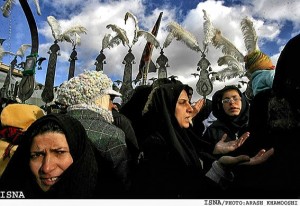By Michael Ireland

Authorities say Iranian internet users chalked up more visits to pornographic sites than people from any other country on Ashura Day, a Shiite day of mourning.
Ebrahim Bayani, a senior official of the Iranian Revolutionary Guard Corps, told a meeting of IRGC commanders and administrators that the Revolutionary Guards Cyber Army has established that among internet users from 182 countries, Iranians made the highest number of visits to “immoral sites” on Ashura Day, according to Mohabat News.
Bayani added that these “alarming statistics” and the use of satellites mean “we cannot expect the youth of the country to have any motivation to fast or go to mosque.”
The Day of Ashura is on the 10th day of Muharram in the Islamic calendar and marks the climax of the Remembrance of Muharram, according to Wikipedia.
It is commemorated by Shia Muslims as a day of mourning for the martyrdom of Husayn ibn Ali, the grandson of the Islamic Prophet Muhammad at the Battle of Karbala on 10 Muharram in the year 61 AH (October 2, 680 CE).
According to Sunni Muslim tradition, Muhammad fasted on this day and asked other people to fast. Sunni Muslims also remember the day claiming that Moses fasted on that day to express gratitude to God for liberating the Israelites from Egypt.
In some Shia regions of Muslim countries such as Afghanistan, Iran, Iraq, Azerbaijan, Pakistan, Lebanon, and Bahrain, the Commemoration of Husayn ibn Ali has become a national holiday and most ethnic and religious communities participate in it. Even in predominantly Hindu country like India, Ashura (often called Moharram) is a public holiday, according to Wikipedia.
Mohabat News says Iranian internet users are heavily restricted in their web access, barred from visiting several news sites and sites that the government deems “immoral.”
However, Iranian web users can overcome state restrictions with special software designed to break through filters, the news agency said.
Iranian Prosecutor Ghilamhossein Mohseni Ejei heads a committee that decides which websites should be blocked by the Islamic Republic government.The committee is comprised of representatives from the ministries of education, communications, intelligence, technology and culture, as well as representatives from national broadcasting and security forces.
Bayani argued that “the enemies” use cultural means and “corrupt internet sites and satellite channels to separate the people from religion and deplete the regime from within.”
He added that “strikes against religious values such as hijab [the Islamic dress code] modesty, philanthropy and hard work, as well as the promotion of loose behavior are among the aims of our enemies’ satellite programming.” –Michael Ireland, ASSIST News



